
Exuberance is beauty. -- Blake

Help yourself to my Planescape Character Generator for MS-DOS.
The rowdy Vikings and their likable gods are a fine metaphor
for those who have chosen this outlook on life.
This is the spiritual home of anarchists and
rowdies who believed they were acting to promote the happiness of
others.
A favorite motto is, "Live Free or Die". Perhaps more AD&D
player characters are aligned to Ysgard than any other
outer plane. The locals -- living and dead --
will point out chaotic behavior and
good tendencies by the adventuring party, and try to persuade
them that Ysgard is their true spiritual home.
Settlements are temorary, and anarchy and government by warlords is the rule here,
though they are more benevolent than their counterparts in our world.
Genuine, unselfish love will occasionally be found here,
and the ordinary loves -- family, friendship, romance --
are more intense than in our own world. A resident of Ysgard will probably
to treat you as a friend until you show that you are not.
Even if you are a joyful anarchist, please don't loot TSR's
copyrights. They're the people that bring us all the good fun.
Ysgard is universes of earthbergs, which constantly pitch and shift.
Strange ships voyage between the bergs. Earthquakes are everyday
hazards here.
Even the good creatures who live here may make war on
one another, often for no good reason. There is even less evidence
of civlization here than on Arborea or the Beastlands. There are many
opportunities for adventurers here, and many authorities say that
more AD&D player characters end up here than anywhere else. The
locals like to party, and often brawl. When player characters
visit, the locals will know -- and remind them about -- episodes
in which they've been rowdy for the sheer fun of it. They'll
try to persuade them that Ysgard is their true spiritual home.
There are numerous armies
and men in uniform, but none of the uniforms match. Much of the
terrain has a Scandinavian motif. Primitives will find a world
filled with wonderful animals. The "Takers" philosophic sect,
which emphasizes individual initiative and achievement, has its
headquarters here. Public
portals between the layers and to remote planes appear as cracks,
crevasses, and so forth.
Spell alterations in
Ysgard: Alterations that would help a warrior
work fine. Those that warp space must be keyed. Those that
deceive can fail at the worst time unless keyed. Those that
enhance memory or other magics work only for those with Odin's
approval. Protective alterations only work if there is a rainbow
visible, or perhaps a special key is used.
No weather-spell works, and they cannot be keyed.
Conjuration-summoning always bring the spirits of warriors.
Divination spells are at double range and duration, but can only
target one creature at a time. Necromantic spells must be
brought at one level higher (i.e., "Spectral Hand" is third-
level). Wild magic requires two rolls, as on Limbo; in choosing
a surge, take the one most like the spirit of the terrain.
Weather magic fails even with keys. Other elemental spells
require keys, except that fire spells work normally in
Muspelheim, and light-based spells work well in Vanaheim.
Wizardly spell keys are
runes, carved on the material
components (if any), or spoken (if no material components). A
kenning may also be required.
Third edition "Manual of the Planes" focuses primarily on simplifying
and encouraging individual campaign creativity. Ideas include:
I respectfully suggest that Ysgard be regarded as good-tending
and thoroughly chaotic. These effects are additive
The Fourth Edition has not yet developed a "Norse Mythology" heaven.
Perhaps visitors would get bonuses or penalties
to intelligence, wisdom, and charisma-based skill checks
depending on how much their behavior has been in keeping with the ideals
of the locals.
In keeping with the flexibility of the third and fourth editions and the
backgrounds of many players, perhaps Ysgard is essentially a world
where like-minded spirits meet. It looks and works like our own world,
except that it is far rowdier and more boistrous and more purposeless,
and you are invited to join in the fun.
NPC attitudes are typically "friendly" to visitors who are not openly hostile
or disapproving of rowdiness.
If there is a spiritual race native to Ysgard, it is devoted to promoting the community's
ideals
among the living by encouragement and subtlety, rather than by force.
The dead find communities matching their own ideals and interests,
and continue to live much as they did on earth, though no longer able to visit the
Prime Plane. Instead of the "gods" of polytheism, each living chaotic, good-tending divine spellcaster is
sponsored (and monitored)
by a prayer fellowship with similar interests based on Ysgard.
For the fourth edition, I suggest no penalties for divine spellcasters from elsewhere. For earlier editions, I respectfully suggest that the only penalty for such a cleric
on a differently-aligned outer plane is the loss of one spell
of the highest available level for each plane removed, with the Outlands two planes from Mechanus, Elysium, Limbo, and the Gray Waste. When one level
is depleted, spells of the next highest level are lost. Thus a cleric
sponsored from Ysgard would lose one spell on Arborea or Limbo,
six spells on Acheron or Gehenna, and seven spells on Baator. Moving to the Outlands loses three spells.
A world where happy anarchy actually works would be as
strange and wild
as any rules-intensive world ever visited by adventurers.
Referees might not want players to realize that they have
entered Gladsheim and its environs. Depending on the site of arrival,
visitors might simply recognize a world of fun-loving, rowdy primitives.
Expect to hear a lot from the clergy about promoting freedom for yourself
and for others.
Gamers for Christ --
news group
Unity of the Rings -- comic book art
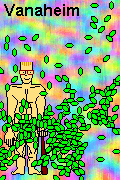 The first layer
is home to the Norse culture, and elves and giants of all kinds.
The River Jordan breaks up into myriads of
luminescent lakes here. "Alfheim", a sub-arctic Elf territory,
is governed by the sect dedicated to the Norse character "Frey".
Elves glow with a "light" spell effect here, and often charm
non-elf visitors into service. It gets cold here in the winter,
and the whole land hibernates. During summer, this is a great
place to buy weapons and armor. Visit "Alfheim" clean-shaven. A
pacifist Valkyrie is a hermitess here. Asgard, the Norse Viking
heaven, is connected to prime worlds by the anti-magical rainbow
bridge. The World Ash has its apex here. Apples of longevity
can be stolen in Asgard. No healing magic works in Asgard, but
residents all have successful "resurrection" (no point loss)
before dinnertime. Even visitors who die heroically have
automatically-successful "resurrection" spells, up the to limit
of original constitution. "Valhalla", the hall of dead heroes,
is most famous. No magic works on the rainbow bridge, but those
who have supported a Norse-style ministry (and only those who
have done so) can walk on it, and reach any destination in 1d6
hours on any world where such a ministry is supported. Himinborg
is the town of "Heimdall's" sect, dedicated to watchful
preparedness. "Vidar"'s quiet realm is populated only by huge
animals. "Vanaheim" borders on Asgard, and is ruled by the Vanir
sects. Noatun is a ship-building town run by the Njord Vanir
sect, while Uller's folk craft bows of yew. As in Asgard, the
fallen are raised each day. Large areas are controlled by
chaotic evil giants. In one anomalous region (Jotunheim) of
Viking Heaven, the frost giants have a heaven. Here is Mimir's
well, where a drink gives 1d4 points of wisdom permanently, once
in a lifetime. Cat Heaven, or "Merratet", is also located here.
There's a city of werepanthers. Visitors become prey to
nightmares of being stalked and pounced upon. The Lammasu
maintain a hospital for wounded adventurers, and lay the
lawful-good advice on heavy. Expect this area to shift
to another plane soon.
Brass Dragon Heaven is a dangerous place
to visit. "Netaph" is an Egyptian province dominated by the war-cult
of "Anhur", on the same earthberg with Cat Heaven. There
are many birds of prey here, and the warriors of this realm make
war against the evil residents of the Lower Planes. "Gates of
the Moon" is a dreamy realm governed by lunar cultists. The
Lillendi snake-folk stand guard here, and visitors can find the
Infinite Staircase, beyond the Gates of the Moon,
which leads to all cities that have ever or
will ever exist. Construction crews are always heard, never
seen, and once in a lifetime, a traveller can reach his or her
heart's desire on the staircase. Skeinheim is the town of the
Givers, who strive to outdo one another in poverty and
generosity, yet always seem to have enough. If they ask, you
will find yourself forced to do some favor to them. Between
Asgard and Vanaheim is the town of Steadfast, a gathering-town
for exiles and misfits, with no government and no willingness to
be governed. Forest green pools to the
astral appear at random and can be
freely moved by viewers. Portals to the Outlands, Arboria or Limbo are often
valleys with overhanging foliage. Muspelheim is a universe
where the earthbergs are reversed, flaming side up. It is the
heaven of fire giants, and lawful evil predominates throughout
this inverted territory. A huge forge provides metal and
instruments for all kinds of giants, and the town of "Njakala"
exports exotic jewelry. Normal creatures take from 1 to 7 d6 of
damage per round of exposure to the fire, depending on its color.
Any spell that creates water acts as a combination "fireball" and
"shout" spell.
The first layer
is home to the Norse culture, and elves and giants of all kinds.
The River Jordan breaks up into myriads of
luminescent lakes here. "Alfheim", a sub-arctic Elf territory,
is governed by the sect dedicated to the Norse character "Frey".
Elves glow with a "light" spell effect here, and often charm
non-elf visitors into service. It gets cold here in the winter,
and the whole land hibernates. During summer, this is a great
place to buy weapons and armor. Visit "Alfheim" clean-shaven. A
pacifist Valkyrie is a hermitess here. Asgard, the Norse Viking
heaven, is connected to prime worlds by the anti-magical rainbow
bridge. The World Ash has its apex here. Apples of longevity
can be stolen in Asgard. No healing magic works in Asgard, but
residents all have successful "resurrection" (no point loss)
before dinnertime. Even visitors who die heroically have
automatically-successful "resurrection" spells, up the to limit
of original constitution. "Valhalla", the hall of dead heroes,
is most famous. No magic works on the rainbow bridge, but those
who have supported a Norse-style ministry (and only those who
have done so) can walk on it, and reach any destination in 1d6
hours on any world where such a ministry is supported. Himinborg
is the town of "Heimdall's" sect, dedicated to watchful
preparedness. "Vidar"'s quiet realm is populated only by huge
animals. "Vanaheim" borders on Asgard, and is ruled by the Vanir
sects. Noatun is a ship-building town run by the Njord Vanir
sect, while Uller's folk craft bows of yew. As in Asgard, the
fallen are raised each day. Large areas are controlled by
chaotic evil giants. In one anomalous region (Jotunheim) of
Viking Heaven, the frost giants have a heaven. Here is Mimir's
well, where a drink gives 1d4 points of wisdom permanently, once
in a lifetime. Cat Heaven, or "Merratet", is also located here.
There's a city of werepanthers. Visitors become prey to
nightmares of being stalked and pounced upon. The Lammasu
maintain a hospital for wounded adventurers, and lay the
lawful-good advice on heavy. Expect this area to shift
to another plane soon.
Brass Dragon Heaven is a dangerous place
to visit. "Netaph" is an Egyptian province dominated by the war-cult
of "Anhur", on the same earthberg with Cat Heaven. There
are many birds of prey here, and the warriors of this realm make
war against the evil residents of the Lower Planes. "Gates of
the Moon" is a dreamy realm governed by lunar cultists. The
Lillendi snake-folk stand guard here, and visitors can find the
Infinite Staircase, beyond the Gates of the Moon,
which leads to all cities that have ever or
will ever exist. Construction crews are always heard, never
seen, and once in a lifetime, a traveller can reach his or her
heart's desire on the staircase. Skeinheim is the town of the
Givers, who strive to outdo one another in poverty and
generosity, yet always seem to have enough. If they ask, you
will find yourself forced to do some favor to them. Between
Asgard and Vanaheim is the town of Steadfast, a gathering-town
for exiles and misfits, with no government and no willingness to
be governed. Forest green pools to the
astral appear at random and can be
freely moved by viewers. Portals to the Outlands, Arboria or Limbo are often
valleys with overhanging foliage. Muspelheim is a universe
where the earthbergs are reversed, flaming side up. It is the
heaven of fire giants, and lawful evil predominates throughout
this inverted territory. A huge forge provides metal and
instruments for all kinds of giants, and the town of "Njakala"
exports exotic jewelry. Normal creatures take from 1 to 7 d6 of
damage per round of exposure to the fire, depending on its color.
Any spell that creates water acts as a combination "fireball" and
"shout" spell.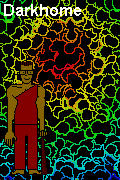 Nidavellir ("Dark Home") is a universe of
labyrinthine, luminescent caves. Probably these are the narrow spaces
between earthbergs. These interconnect many places
and times, typically emerging in ruins. The Norse cult of
"Hodur", the blind smith, is headquartered here. Many artists
live and work here. Norse-style dwarves control much of the
territory here, and they are allowed to be wizards. The domain
of the good dark elves is here, too. It is all silvery light,
glitz, costume jewelry, and cheap decoration, without substance.
Everyone visiting here can sing well, and a bard has a bonus of three
levels on all abilities except combat and spells. Yggwyrd is the
city in which any dark elf can talk to any ancestor's spirit.
Nidavellir is a common location for the headquarters of sects
devoted to wine or partying. Elves and dwarves make war on one
another for some reason. Eatan is a universe without solid
stars or planets. Instead, it is filled with huge water blobs.
The background is lit by "continual light". Those returning home
from this plane may find themselves in their own past or future.
There are probably many more layers.
Nidavellir ("Dark Home") is a universe of
labyrinthine, luminescent caves. Probably these are the narrow spaces
between earthbergs. These interconnect many places
and times, typically emerging in ruins. The Norse cult of
"Hodur", the blind smith, is headquartered here. Many artists
live and work here. Norse-style dwarves control much of the
territory here, and they are allowed to be wizards. The domain
of the good dark elves is here, too. It is all silvery light,
glitz, costume jewelry, and cheap decoration, without substance.
Everyone visiting here can sing well, and a bard has a bonus of three
levels on all abilities except combat and spells. Yggwyrd is the
city in which any dark elf can talk to any ancestor's spirit.
Nidavellir is a common location for the headquarters of sects
devoted to wine or partying. Elves and dwarves make war on one
another for some reason. Eatan is a universe without solid
stars or planets. Instead, it is filled with huge water blobs.
The background is lit by "continual light". Those returning home
from this plane may find themselves in their own past or future.
There are probably many more layers.
-1 on all charimsa checks for all evil creatures
-1 on all intelligence, wisdom, and charisma checks for all non-lawful, non-chaotic creatures
-2 on all intelligence, wisdom, and charisma checks for all lawful creatures.
Good-based spells (non-lawful) work as if caster were 2 levels higher.
Evil-based spells (non-lawful) require a Spellcraft check (DC 15) for success.
Law-based spells simply fail.
Chaos-based spells work as if caster were 4 levels higher.
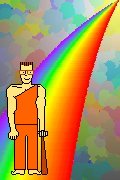 To think about:
To think about:

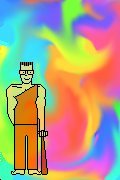


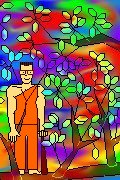

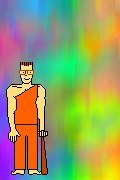
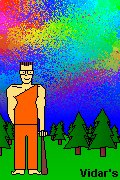
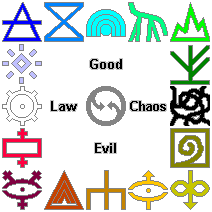
Acheron -- Lawful, Evil Tendencies
Arborea -- Chaotic Good
Arcadia -- Lawful, Good Tendencies
Baator -- Lawful Evil
The Beastlands -- Good, Chaotic Tendencies
Bytopia -- Good, Lawful Tendencies
Carceri -- Evil, Chaotic Tendencies
Elysium -- Neutral Good
Gehenna -- Evil, Lawful Tendencies
The Gray Waste -- Neutral Evil
Limbo -- Chaotic Neutral
Mechanus -- Lawful Neutral
Mount Celestia -- Lawful Good
The Outlands -- True Neutral
Pandemonium -- Chaotic, Evil Tendencies
Ysgard -- Chaotic, Good Tendencies
The Inner Planes
What "Planescape" could be
AD&D and the Religious Right
Li Po's Hermitage (character generators, more)
Background by Ed
Ed's character generators:
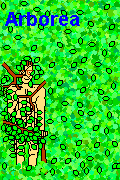
More good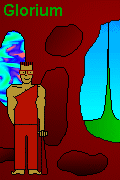
Less extreme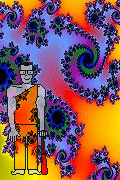
Less good
Fourth Edition
Third edition: DD3.5, d20 Modern, Dragonlance, Eberron, Forgotten Realms, lots more.
AD&D2 Generic Character Generator for MS-DOS.
AD&D2 for very limited machines for MS-DOS.
Alternity Science Fiction Character Generator for MS-DOS.
Birthright Character Generator for MS-DOS.
Dark Sun 2 Character Generator and
documentation for MS-DOS.
Jakandor Character Generator
Lankhmar Character Generator
Planescape Character Generator for MS-DOS.
Psionics Character Generator for MS-DOS.
Red Death Character Generator for MS-DOS.
Skills & Powers Character Generator for MS-DOS.
New visitors to www.pathguy.com
reset Jan. 30, 2005:

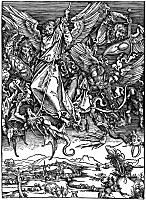
![[Do Justice, Love Mercy, Walk Humbly]](holywar.gif)

